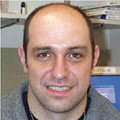
FACULTY
Robert H. Yolken, M.D. – Director

Dr. Yolken is a virologist who became interested in the study of serious psychiatric disease at the suggestion of Dr. E. Fuller Torrey, now of the Stanley Medical Research Institute. Dr. Yolken developed many of the diagnostic assays for viral infections which are in current use. He has applied these methods for the detection of infectious agents which might be involved in schizophrenia, bipolar disorder, autism and related disorder (see Department/Programs section of this website). He is author or coauthor of more than 250 scientific papers and several recent books, including the Manual of Clinical Microbiology and Beasts of the Earth. He also contributes to the laboratory by providing the photographs which cover the walls of the corridors and offices of the Stanley Laboratory. Some of these can be seen at http://www.pbase.com/rhyolken/exhibit. Robert H. Yolken on Pubmed.
Raphael P. Viscidi, M.D. – Professor

Dr. Viscidi is a virologist, whose primary interest is human papillomavirus (HPV) and polyomaviruses (PV). These viruses are very common in human populations but rarely cause disease. HPV is the etiological agent of cervical and other anogenital cancers and a subset of oral cancers. PVs are responsible for a rare fatal brain disease, progressive multifocal leukoencephalopathy, nephropathy in renal transplant recipients, and a rare skin cancer, Merkel cell cancer. Both viruses encode oncoproteins and thus are the subject of continuing investigations as causative agents in diverse human cancers.
The focus of research in Dr. Viscidi’s laboratory over the last several years has been studies of humoral immune responses to HPV and PV using virus like particles (VLP) based enzyme linked immunosorbent assays. He has conducted many cancer case control and population-based seroepidemiological studies of HPV and PV infection. His laboratory has expertise in production of virus like particles using the baculovirus expression system, and another focus of research is the development of VLP-based vaccines and studies of immunological properties of VLPs.
The laboratory is also exploring applications of a novel chimeric VLP construct, invented by Dr. Viscidi, as a platform for vaccines against cancer and infectious agents, including malaria and human immunodeficiency virus. Dr. Viscidi is also interested in the how VLP-based vaccines activate innate immune responses and is conducting studies of global gene expression in subpopulations of peripheral blood immune cells in response to VLP vaccination. Another very different area of study in the laboratory is population genetics of Neisseria gonorrhoeae and the molecular evolution of antibiotic resistance.
In collaboration with STD researchers and a molecular evolutionist, Dr. Viscidi is studying temporal trends and epidemiological correlates of the population structure of N. gonorrhoeae using massively parallel sequencing of whole bacterial genomes. Raphael P. Viscidi on PubMed.
Lorraine V. Jones-Brando, Ph.D – Assistant Professor

Dr. Jones-Brando’s research is aimed at the potentially detrimental longitudinal consequences of microbial infections on the pathogenesis of serious psychiatric disorders such as schizophrenia and bipolar disorder. She addresses this by pursuing the discovery and development of novel small molecules or repurposed drugs for use as anti-infective adjunct therapy in the treatment of these disorders. For this research she employs virus-host cell or parasite-host cell systems to study the effects of a variety of compounds, e.g., antipsychotics, mood stabilizers, plant extracts, nutraceuticals, food additives, and novel synthetic compound panels, on the in vitro replication, and in vivo growth of infectious agents. In addition, Dr. Jones-Brando investigates the immune response to specific microbial infections as potential biomarkers of eventual cognitive decline, suicidal behavior, or diagnosis of psychiatric disorder, using Western blot technology to elucidate differences in patterns of microbial antigen recognition between diagnostic groups. Lorraine V. Jones-Brando on PubMed.
Sarven Sabunciyan, Ph.D – Assistant Professor

Dr. Sabunciyan’s work is focused on identifying the etiology of psychiatric disorders. He uses high throughput sequencing methods to characterize RNAs that are differentially expressed in brain and peripheral tissues between disease cases and unaffected controls. His work has discovered that repetitive sequences are abundantly expressed in the human cortex and widespread splicing of these sequences into coding regions of gene mRNAs occurs in many tissues. His group is currently trying to determine the functional implication of repetitive element splicing in the cell. In addition, Dr. Sabunciyan is investigating the potential role of circulating RNAs in brain development using animal models. Sarven Sabunciyan on PubMed.
Emily Severance, Ph.D – Assistant Professor

Dr. Severance’s research program centers on the major gateway of the immune system, the gastrointestinal mucosa, where a dysregulated microbiome can adversely impact brain function. Her studies aim to explore how abnormalities of the gut-brain axis may be particularly compounded in people with psychiatric disorders and how gene-environmental interactions during neurodevelopmentally-sensitive perinatal time periods are consistent with gut-based hypotheses. Implicated mechanisms include the transport of toxic intestinal products to the brain through compromised endothelial barriers, direct binding of microbial- and food-derived peptides to faulty neuronal and glial circuitry, and the indirect modulation of genetically polymorphic, synapse-active immune pathways, such as complement. A recent focus of Dr. Severance’s research is to understand the non-bacterial component of the human microbiome and how fungal exposures might result in cognitive deficits and worsening of psychiatric symptoms. Identifying individuals who can be treated with dietary, immune or other interventions that help to harmonize the microbiome is the ultimate goal of this line of research. Emily Severance on PubMed.
Jian-Chun Xiao, Ph.D. – Instructor

Dr. Xiao’s research aims to determine how Toxoplasma gondii infection is involved in the etiology of psychosis, especially schizophrenia and bipolar disorder. Toxoplasma is a protozoan parasite that infects approximately ~ 25% of the world’s human population. As a neurotropic parasite, Toxoplasma causes significant brain and behavioral anomalies in humans and other mammals. Dr. Xiao’s research focuses on why some infections with Toxoplasma result in disease while others do not. Her work reveals a number of disease-associated risk factors of Toxoplasma such as strain type and parasite burden. She also developed ELISA assays for identifying the strain type of infection and for measurement of the level of chronic infection located in the brain. Her goal is to achieve predictability between pathogenic and non-pathogenic Toxoplasma infections in humans. Another focus of Dr. Xiao’s research is to tease out brain effects of Toxoplasma infection during acute and chronic infection. Her work suggests that infection causes changes on host gene expression, microRNA, neurotransmitter, signaling pathway, and behavioral abnormalities. Most of these findings have shared mechanisms with hypotheses implicated in psychosis and mental disorders. Dr. Xiao is interested in finding a way to treat chronic Toxoplasma infection through a better understanding of host cellular immunity. Jian-Chun Xiao on PubMed.
FELLOWS
Miranda Darby, PH.D – Postdoctoral Fellow

Dr. Darby is examining RNA expression changes in host cells following Toxoplasma infection. She is especially interested in identifying the mechanism(s) whereby Toxoplasma infection can trigger epigenetic changes and affect RNA expression in the host. She earned her PhD in Molecular Biology and Genetics from the Johns Hopkins School of Medicine.
Ye Li – Postdoctoral Fellow

Dr. Li works with Dr. Jian-Chun Xiao on the Toxoplasma gondii research. He is interested in providing clues as to how a common parasitic infection can vary greatly from person to person. Since the central nervous system is the major site of Toxoplasma infection, Dr. Li works to identify the mechanisms by which Toxoplasma precipitates CNS effects. The experimental approaches include classical molecular and histological techniques, in vitro cell culture systems and in vivo mouse model systems, HPLC, neuroimmunology, neurochemistry and imaging.
Emese (Prandovszky) O’Donnell, PhD – Postdoctoral fellow

Dr. O’Donnell graduated with a PhD in Clinical Bioscience from the University of Szeged, Hungary. Through her post-graduate education she has become a neurophysiologist specializing in infectious diseases. She is especially interested in host/parasite interactions as they relate to the etiology of psychiatric diseases. Her experimental approach to this investigation includes using HPLC, the Luciferase Immune Precipitation System (LIPS) and classical molecular and histological techniques in both in vitro cell culture systems as well as in vivo mouse model systems.
STAFF
Claudia Bordon – Research Specialist

Ms. Bordón works with Dr. Jones-Brando in her drug and biomarker laboratory. She maintains all animal cell culture lines as well as parasite, bacterial and virus stocks. Her primary responsibility is the screening and further in vitro testing of approved/licensed drugs, plant extracts and purified principles, novel synthesized compounds, etc. to determine efficacy against a variety of infectious agents, including Toxoplasma gondii, human cytomegalovirus and Zika virus. In addition to cell-based assays, Ms. Bordón assists in biomarker discovery using commercial or in-house western blots to screen study sets of serum samples for diagnostic-group differences in antigen recognition specificies.
Ashley Lea – Research Specialist II
Ms. Lea works with Dr. Severance to test hypothesis regarding the role of the microbiome and gut-brain axis in major psychiatric disorders. Ms. Lea examines disease associations of commensal microbes, infectious agents and dietary antigens using a wide range of protein biochemistry and nucleic acid-based techniques. She is responsible for organizing and screening a variety of biospecimens for evidence of microbial presence and host immune alterations.
Bryan Deuber – Research Technician

Mr. Deuber works with Dr. Jones-Brando in the algal cell culture and virus laboratory. He maintains all algal cultures and virus stocks, providing algae and virus preparations for in vitro and in vivo testing. In addition he is responsible for processing biological samples for determination of the presence of live virus and/or anti-virus neutralizing activity.
Kristin Gressitt – Research Technician

Ms. Gressitt works with Dr. Severance to test hypotheses regarding the role of food antigents and microbial infections in major psychiatric disorders. Ms. Gressitt uses protein- and nucleic acid-based techniques to screen a variety of biospecimens for evidence of immune and genetic alterations.
Flora J. Leister – Research Specialist

Ms. Leister works in Dr. Yolken’s laboratory. She is currently using Brain DNA and cDNA in Real Time PCR looking for SNPs and gene expression, respectively. She also test Serum DNA for SNPs and for viral expression, as well as supplying these samples to other labs for their research.
Elizabeth Rubalcaba, Research Specialist

Ms. Rubalcaba works in Dr. Viscidi’s Laboratory. She is working on projects that involve the production of virus-like particles. She is also involved in projects to detect genetic changes in endogenous retroviral envelope proteins that may affect changes in expression in human brains.
Barbara R. Silver, Research Specialist

Mrs. Silver works in Dr. Viscidi’s laboratory. She develops and performs serologic assays on viral pathogens with known or suspected links to cancer
Shuojia Yang, Research Specialist

Ms. Yang works in Dr. Yolken’s laboratory. She is investigating the viral gene expression in the brain that may cause several types of psychosis by using PCR, Templiphi/Genimiphi amplification, cloning and sequencing. Some of her other responsibilities include DNA extractions from whole blood and serum, generating large quantity of DNA for the studies. She is also part of the serology study (anti-HERV-W protein antibody in serum).
Ou Chen – Research Specialist

Ms. Chen is working with Dr. Sabunciyan to identify transcriptional changes that occur in psychiatric disease. She is also investigating the potential implications of repetitive element expression and spicing in the cell. Ms. Chen has expertise with high throughput sequencing methods and is involved in developing NGS assays for characterizing circulating RNAs.
Ann C. Cusic, Administrative Manager

Ms. Cusic is responsible for the day-to-day operation of the Division which includes payroll, ordering of supplies, maintenance of Divisional server, teleconferencing unit, preparation of all research grants and manuscripts, time and attendance for support staff, and the maintenance of the website. In addition, Ms. Cusic is responsible for receiving all samples that are sent to Dr. Yolken’s lab, logging the samples in, issuing a study number, issuing a JHU sample number, entering all of the test data. She is also responsible for the coordination of the annual Stanley meeting. In addition, Ms. Cusic is the liaison for the Division with the Department of Pediatrics’ Business office, School of Medicine Research Administration, School of Medicine Research Accounting, Hopkins International Office, and the Stanley Medical Research Institute.
Ruby L. Mason – Laboratory Technician II

Ms. Mason works with Dr. Jones-Brando. She maintains the Stanley Lab’s glassware and autoclaving facilities as well as the inventory of the laboratory supplies room. She assists the faculty, fellows and research technicians in Dr. Yolken’s laboratories as requested. In addition she performs commercial ELISAs on the serum studies that come into the Stanley Labs for analysis.
